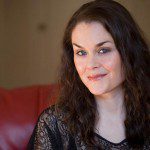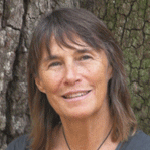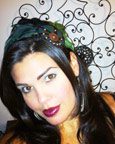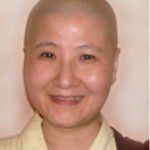The Divine Feminine Names
Shareda Hosein, is a Muslim chaplain bringing people together one conversation at a time. She works with the Association of Muslim Chaplains in Boston, Massachusetts.
The Divine has ninety-nine names or attributes according to Muslims. Many of these Divine names are incorporated and recited after the five daily prayers and randomly throughout the day by both women and men. These attributes are both feminine and masculine in nature leaving the Divine genderless. This genderless Divine brings much comfort to women because the Divine is omnipotent, absolute, majestic and creator of the all the universes transcending all dualities – beyond male or female. God is The One neither She nor He, transcending gender and yet allowing relatedness through the feminine and masculine attributes. Ibn Arabi, a famous Sufi Islamic scholar stated that it was perfectly acceptable to refer to God in the form of She or He because God is beyond gender and can be both or neither allowing no preferential treatment.
Over 1,400 years ago in an exclusively patriarchal world, the words of the Divine in the Quran liberated and uplifted the terrible conditions in Islam and began the empowerment of women with the hope that it would become a global movement. It was the first consciousness that came to humanity regarding the treatment of women. They were no longer property but seen as a person, equal to men in the eyes of God. Needless to say this freedom or liberation only lasted for the first twenty-three years Islam and the global images of inequality and oppression of women in Islam appear to be relapse in many Muslim communities with social customs taking precedents over the Quranic text. Women preserved in their faith and excelled in many ways because women are Merciful, one of the greatest attributes of the Divine. The Arabic word for merciful is Rahman and the Arabic word for womb is Rahm from the same root word of merciful. Can this be coincidental or purposefully designed that the sacred core of humanity, the womb is from one of the Divine’s attributes? Maybe in the inner knowingness of women, the Divine is inside them or very close to them, which allows for this perseverance and resiliency of spirit waiting for the day of liberation.
Maybe women saw these feminine names or attributes of the Divine like Al Hakim, the Wise, Al Rahman, all merciful, Al Kathir, the abundance as proofs and signs that the Divine isn’t chavanistic or patriarchal because the words in the Quran women reveres as equal to men and both are equally responsible for the future of humanity. This is the hope that women have seen throughout the ages from the men who honor the Divine feminine attributes and honor the religious edicts for women of equal status and respect. As the Quran gave women these rights 1,400 years ago, I believe the bounteous World Wide Web, the Internet, will become an important vehicle to re-liberate Muslim women today in their empowerment to help build a more sustainable planet.
The Sufis knew that the soul is feminine before God, waiting in a state of surrender for the Beloved to come. I believe the mystics knew this fact from the beginning and honored the Divine feminine inside self and gave respect and equal treatment to the women. Rumi, the great Sufi and poet honored the Divine Feminine through his famous poems. Here is one of his poems.
Face of Divine Feminine in Islam.
Woman is the radiance of God;
Woman is the splendor of God;
She is not your beloved. She is the creator
– you could say that she is not created.
Rumi (Masnavi I:2437)
What is the Divine Feminine?
Mohini Moore is on the Board of Directors of the Morningstar Foundation.
The Divine feminine is…
The swell in my heart when I see you again
The gentleness of a loving touch, the warm comfort of a hug
It’s the connection I feel when I look into your eyes
When I know what you know and feel what you feel
It’s the joy of friendship, the grace of a helping hand
It’s shared laughter and shared tears
It’s the mystery of creativity, the energy of manifestation
It’s the inspiration to learn, to grow and to explore
It’s the power of passion and the infection of positivity
It’s the voice that speaks up to injustice and stands in solidarity
It’s the strength deep within that sees me through all things
It’s compassion and understanding
It’s beauty and gentleness
It’s intrinsic power and force
It’s the simple beauty of the forest with trees both graceful and strong
It’s the gentle caress of snowfall and the whip of an autumn breeze
It’s the majestic force of the ocean and the ebb and flow of the tides
It’s the brilliance of the moon and stars in a midnight sky
It’s the miracle of sunset and sunrise
It’s the angel the creates a near miss out of a deadly impact
And that timely hand that catches me when I would have otherwise fallen
It’s the magic of coincidence and signs big and small
It’s miracles and blessings for all
It’s the voice that whispers deep inside when I’m alone and quiet enough to hear
It’s the faith that all I need do is follow my heart and my path is ever clear
It’s the reminder that I am never alone
And have the ability to share
It’s LOVE in all it’s miraculous forms
The Divine Feminine: A Return to My Inner Sanctum
Reverend Guo Cheen, is an ordained Buddhist nun in the Mahayana Chan tradition and works with the Compassionate Action Network in Seattle, Washington.
Deep loathing. Self-hatred. A nagging inner critic.
More Western women I know suffer from the occlusions of these shadows.
Is that why we seek to fulfill ourselves through food, sense overload, obsessions and sometimes, even righteous calls to action? We want to be loved and respected; we want the approval of EVERYONE.
To me, the Divine Feminine is the full embrace of a knowing, knowing that I am filled to the brim with wisdom and compassion.
How can I hate myself when I am an embodiment of such inherent goodness?
A divine feminine version of the Buddhist “prodigal son” tells of a woman who sets out to begin a life on her own, independent of her wealthy family. Despite her hard work and strivings, impoverishment, distress and unkindness followed her. After several years of toil, she decided to return home.
Welcomed back warmly, she entered her bedroom to clean up and relax. As she was removing her worn and ragged jacket, she noticed a light coming from the linings of her winter coat. The seams had ripped and she looked inside: it was a gigantic diamond!
All along, she had the riches with her. All that she was searching for was already there within.
She had truly come home — home to the Divine Feminine.
The Full-Bodied Divine-She
by Meggan Watterson, Founder and Executive Director of REVEAL- The Next Generation of Feminine Spirituality

“Whoever wants to have a deep love in their life must collect and save for it and gather honey.” –Rilke
When I came home to my body, when I felt my soul flush to my skin like a comforter is to a duvet cover, I tasted honey. The unconditional love of my soul seeped out from within me, as if from my bones, in an intoxicating sweetness that was both fierce and feminine at the same time. Fierce because I could tell this love would never leave me- had never left me. And feminine because it was a soft, unguent substance- this love- that held everything together- including me.
Winning back my body, recognizing and remembering my skin as sacred, released a liquid gold from within me that allows me to experience the depths of my own love. All this love I had been pouring out of me circled back in on itself, like the legendary Ouroboros, and I tasted my own sweetness. I recognized myself at last as that elusive beloved I have been on a pilgrimage to find for over a decade.
I knew then, while the honey suffused me, that I was whole, that I was only love at my core, and that the divine is wisely hidden in the folds of our very human skin for good reason. To hide the divine in the human requires that we love what has not yet been loved inside of us. The sacred alchemy of this demands that we embrace our most un-love-able aspects, all the banished and exiled parts of who we are, only then will we know our true worth in gold.
Only then will we know the truth of who we really are.
Walking the path of the divine feminine is an intentional process of going within. Ultimately, the path of the divine feminine is about going within to become intimate with the voice of our own beloved soul. It’s about falling in love but knowing it for the first time as our own- as the love we have always needed to share not just with everyone else but foremost with ourselves.
This path has been considered heretical, secretive, revolutionary, subversive, and has been silenced, repressed, even in some centuries out right burned at the stake.
Read French mystic Marguerite Porete’s “The Mirror of Simple Souls” where she recounts conversations with her soul that reveal she is divine love incarnate- both she and her book were burned by church “fathers” in Paris in the Middle Ages.
Why all the fear?
Connecting with the unconditional love within us, hearing and following the voice of that love, our soul-voice, leads us to freedom.
And the liberation of women is a vehicle for the incarnation of the divine feminine.
The world hasn’t been ready for the full bodied divine-She to be here. Not until now.
Queen of Light
by Anne Scott of Dream Weather
Why is the divine feminine so elusive in our culture?
A friend of mine works in a public school kitchen making meals for young children. She works side by side with women who tell her their stories. Often she listens to tales of hardship and suffering. After an especially difficult day, she had a dream. In her dream she was told, “Santa Lucia is our patron saint.” She searched on the Internet and discovered that St. Lucia was a religious martyr, and took this to mean that she was doing something wrong. Like many women, she is quick to discount herself, and the dream’s wisdom was nearly lost.
By the time she asked me what I thought of the dream, she was quite anxious. But St. Lucia, to me, is the eternal feminine as she would not die when the Roman’s tried to kill her. Her name is derived from lux, lucis, ‘light’ and I had read that St. Lucia is sometimes known as “The Queen of Light.” She is also celebrated in Northern European countries as light at the beginning of the dark days of winter.
I suggested that the dream is showing her that she can hold a light for those around her, especially since she listens to the women’s stories. Not only does she have the ability to hold light for these women, but she can also become more aware of her own capacity for light. I could sense her body relaxing as she resonated with this explanation, and how it helped her to come back into relationship with the dream and also a part of herself.
We cry out for this light, even if we don’t even know what it feels like to live the light.
As part of my work with women over the last 20 years, two year ago I began to offer programs for newly homeless women. The groups have included a nurse, a bookkeeper, a classical pianist, grandmothers, wives, mothers, a schoolteacher, a security guard, a grandmother who began working when she was 13 to support her family. I have met women whose ancestors are English, Cree, Choctaw, Pomo, German, African, Eritrean, Brazilian, Guatemalan, Mexican, Italian and Haitian. They are now living in shelters; a few live in their cars.
From my time there, I have learned that women have an undiscovered landscape. As I sit in a circle with the women in the shelter, I witness the place in them where there is pure water. It flows through their stories, and is suddenly present in the room. It feels like peace, or a softening, as a woman’s tears are given space with no need for understanding them.
A grandmother came to our meeting for the first time. She wore hair curlers and a sweatshirt. She explained that she has worked her whole life. Due to strained relations, she can no longer live with her sister. She spent a week in a hotel with her adult son because she had lost her home. She apologized for sounding as if she was complaining. That wasn’t, she explained, her usual way. But after 3 weeks in a shelter for the first time in her life, she felt only despair.
We then had a brief period of silent meditation. In the quietness, the atmosphere became clear and light. The women were still and relaxed. Seven minutes later, I closed the meditation. I glanced at the woman with hair curlers. Her eyes were still closed. The tension in her face was gone and she appeared to be in a deep state of peace.
Some of the women spoke about their experience of the meditation. This grandmother asked, “What does it mean if you see a color? I saw a beautiful blue green color. I’ve never seen anything like that before. It made me feel very peaceful. I’ve worked so hard my whole life. I guess I never had time for going inside.”
Over the centuries, the knowledge of the feminine became buried deep within us. We have to learn again how to listen to our bodies, our dreams, and to a softer voice inside that is trying to guide us.
The Divine Feminine and Masculine
by Jeanie DeRousseau, PhD, Anthropologist Imagine the Good and Light Pages

I have been struggling with the divide between male and female all of my life. As a child, I worked hard to throw a ball like a boy. I remember being bored on one of my first dates, but realizing that I would have to listen to men my whole life. I knew there was something about being male that was better than being female.
Raised as a Catholic, I had powerful images of God as masculine, but there was also Mary, and my altar to her was an established part of my childhood room. I went to her for unconditional love.
As an adult my religion turned toward a personal spirituality, but I continued to experience my own deference to men, along with job pay inequity in my profession as an anthropologist. I wasn’t drawn to the feminist movement, but with the birth of my daughter, I began the journey toward my own value as a woman… for her sake.
Here was where my struggle with the masculine/feminine divide began in earnest. What was in me unsatisfied, wanting to be expressed, that had always turned instead toward what my culture expected of me?
Carrying my training as an anthropologist with me, I began a journey of relationship with other women (and some men) also called toward a truer way of being. I paid close attention to their journeys; we developed deep relationships, and exchanged our experiences in circles. There was a relaxation going on in which we were learning to let go of our cultural conditioning, and be more authentic with one another.
A key part of this mutual learning was co-creating environments for each other that were safe … safe from the culture that we live in, the culture that has embodied such a limited sense of what people are. In the safety of these gathering ‘spaces’, I stretched and watched others stretch into a much bigger sense of Being, and bring vulnerable aspects of themselves home to themselves.
Often, as we set our conditioning aside, we called to the Divine. With words as varied as the backgrounds we brought, we opened sacred circles and enveloped ourselves in the Ineffable. In deep relationship, we would feel more like ourselves, and yet more connected to each other, and sometimes the space was palpable as a substance between us.
We were opening to experience together who we really are, receiving and mirroring one another, allowing the transcendent in us to become real. It is from my experiences in these many unitive circles that I draw the following words about the divine masculine and feminine.
The Divine Feminine in ourselves is that aspect of the Mystery of Being that is spacious and whole and accepting and allowing, that invites energies to converge and coalesce and co-create, to relax and dissipate and expand, that assembles and re-assembles us into larger wholes, without ever losing the essential quality of wholeness at every level.
The Divine Masculine in ourselves is that aspect of the Mystery of Being that seeks essence, that looks through the spaciousness and the assemblies toward the seed of possibility and brings attention to that origin, that focuses energies into a coherence of intention and a greater awareness of the particular.
As many sacred symbols verify, existence is the embrace of this wholeness/essence process, the breath of life itself, the flow of expansion and contraction that manifests all that is. And in this moment on earth, many of us are awake to an urgency for the wholeness principle, the Divine Feminine, to become an active agency.
This is my wisdom, arising from my journey. It is my healing of an underlying imbalance that is woven through most cultures around the globe. It is my acceptance of being a woman and words to my dance across the masculine/feminine divide.















